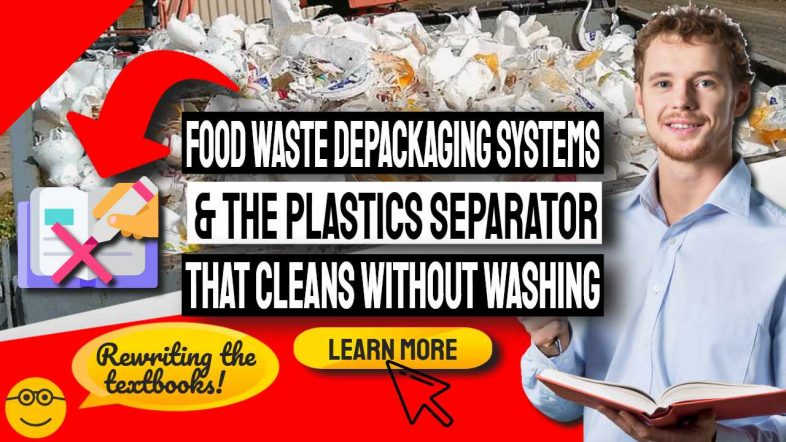Food waste depackaging systems have advanced greatly even to one that “cleans without washing” which is manufactured by DryCake. In our opinion, the DryCake “Twister™” is quite remarkable, and the truth of this is clear to see for anyone who takes a few minutes to watch the Twister plastic separator unit discharging as it opens and cleans food packaging.
It's easy to see that the plastic film and the containers which pop out are remarkably clean, and intact, in the depackaging video which follows. Watch the heavier packaging drop from a conveyor, and see the plastic film as it is blown out and flutters down.
Take a moment to watch the DryCake Depackaging Video here, because it will show you how this equipment works far quicker than reading!
Because of the turbulence, the results of the speed tests indicate chaotic behaviour. Water in the bottom of the cylinder twists and exits the cylinder after passing through the filter while air is pulled up and twists before exiting the cylinder after passing through the filter. A small amount of air escapes through the filters as well and the result is remarkably clean.
The system does this without washing. The necessary water use is low, and the resulting output is a slurry or “paste” which is high in solids and low in water content. This means that there is no need to transport any more water than necessary, and onward transport costs are as low as possible.
The separated organics can easily be taken to a biogas plant for digestion and biogas production and this material will be welcomed. That's because the plastics, and especially microplastics, are so low.
Power use is also low for this sort of equipment at 3-5 kW/hr per ton of waste processed. That's more important than ever now that showing low emissions and a high degree of sustainability is becoming vital to every business.
But most importantly, the quality of the clean plastic which this equipment produces makes this depackager a perfect purchase for recycling facilities, ERFs and MRFs everywhere. Waste processing facilities are badly in need of new ways to produce plastic recyclates that are clean.
When recycled plastics are clean they command the best possible sales value.
Plastic Waste is a Hot Topic
How plastic waste is managed has been much publicised recently and it remains a hot topic globally.
Governments of wealthy nations are seeking to limit plastic waste exports to RDF or “recyclable plastic” because they have been severely criticised for dumping it on less well-developed countries.
Numerous press reports have shown exports of so-called “plastic recyclates” to developing nations which have ended up strewn in forests and littering beaches. Exports of so-called recyclable plastics have been occurring which are contaminated to the extent that little more than landfilling can be done with them.
Similarly, nations such as the UK have been exporting ever-rising quantities of Refuse Derived Fuel (RDF) which contains mostly plastics. However, to comply with the Waste Hierarchy most of this material should be being recycled as clean plastic recyclate.
Public concern about the export of waste, only for it to appear on beaches and on land around the world, has now risen to the point that politicians are being forced to act.
Never has there been such widespread public recognition of the vital need to handle plastics better. In the UK plastic pollution in the sea which has been shown to be injuring animals on TV screens in numerous documentaries has led many people to despair. David Attenborough and others have understandably given the entire plastics industry an appalling reputation.
Rising Public Resistance to Buying Plastic Products
Consumers are turning away from plastic use and actively seeking out and buying non-plastic based alternative products. They are choosing paper with cellophane, and cardboard wrapped products, in preference. These may be less hygienic and lead to food perishing sooner. They say they don't want plastic.
But, plastic packaging has brought us cheap, and fresh food for generations. There is nothing better.
All it needs to restore that reputation is for the Waste Management industry to invest in the latest generation of repackaging technology exemplified by Dry Cake with their “Twister™ vortex system separator at its core, and get industry-wide plastic recycling to work as it should.
If food waste is depackaged in a responsible and sustainable manner to ensure the resulting packets are largely whole and clean plastic, the sector will be transformed by producing:
- valuable clean plastics recyclates that can be easily separated into individual polymers and made into resin granules for use in plastic pressing machinery and economically reused. This will avoid new taxes throughout Europe to be levied on single-use plastic packaging
- a low water content organic output free from plastics which is ideal for use as anaerobic digestion plant feedstock.
If clean and pure, the plastic waste stream becomes a valuable polyolefin (PO) material resource. What emerges from this depackager is a mixed plastics output. But, this can also be separated into individual polymer waste streams for added value.
The demand for recycled PO, and all of the popular plastic polymers is growing.
Recycled plastic is needed by plastic packaging manufacturers to incorporate into new packaging. And, in order to produce plastic products that contain a proportion of recycled plastic the packaging manufacturers are now willing to pay more for the recycled polymer than they pay for new resin.
Landmark Changes in Plastic Waste Regulation in 2021
Sadly, landfilling will inevitably remain the first option for millions of tonnes of plastics worldwide for some years to come.
But, this has to change, post COP26.
Changes in state legislation, and a new awareness of plastic pollution internationally, are about to bite. These will drive historic improvements in the way plastic waste is managed.
So far this year alone, three new, or updated, pieces of legislation have been introduced that, will impact long-struggling plastic reprocessing companies for the better.
These are:
- the Basel Convention Plastic Waste Amendments,
- China’s ban on solid waste imports, and
- the European “Green Deal”. EU Green Deal legislation shares the goal of restricting the movement of unsorted plastic waste not destined for environmentally sound recycling or disposal.
Alongside the present regulations governing the management of plastic waste, there will be new legislation. New higher plastic recycling targets will mean that waste facility operators will find a higher demand for their recycled output.
The new legislation will stipulate an obligatory level of recycled content to be used in the manufacture of plastics for use in food and drinks packaging. It's happening throughout Europe, and other nations are following the EU and UK to do this.
Recycled-content laws introduced in the European Union in October 2018 mean manufacturers must ensure plastic bottles have a minimum of 25 per cent recycled content by 2025, and 30 per cent by 2030.
The UK Goes “Greener and Sooner” than the EU on Plastic Recycling
In the UK, the government has taken this one step further, with the introduction of a new Plastic Packaging Tax commencing in April 2022.
This will apply not just to plastic bottles but to all UK packaging manufacturers and importers of plastic and all packaging. It will be levied on all packaging containing less than 30 per cent recycled material.
Now that the UK has left the EU it is free to exceed EU standards. And on plastic packaging, it is acting sooner and taxing harder.
The purpose of the tax is to encourage the use of recycled plastic in packaging as part of the circular economy. This new legislation will effectively impose a £200/tonne tax on plastic packaging with less than 30 per cent recycled content.
The Hard Truth About UK Plastic Recyclate Exports and Food Waste Depackaging Systems
UK plastics reprocessors have relied for too long on exporting their material. They do it because their plastic recyclates can generally command a higher market value abroad than if they were to sell it domestically.
Due to a lack of investment in plastic separation technology, and especially food waste repackaging systems, in the UK, a lot of plastic is removed in Materials Recycling Facilities (MRFs) and related waste processing facilities (such as MBT facilities) and is shipped abroad as RDF.
A proportion is sold as RDF to EU municipalities that have over-capacity in their incinerators. This has been happening despite the fact that circular economy principles state that (according to the EU Waste Hierarchy) plastic waste should be:
- if possible reused and if not,
- recycled.
Incineration is neither “reuse”, nor “recycling”. It is classified as “energy recovery”.
As we noted earlier, a lot of dirty plastic has been exported inappropriately only to end up at best in the landfills of developing nations, and at the worst spread on land and washed into the sea.
The majority of public opinion, in the UK in particular, is in favour of government action to stop plastic waste exports.
Waste Plastic Processors Invest in “New Technology” Food Waste Depackaging and Separation Systems
The legislative changes will provide an investment incentive for much better plastics processing not just in the UK, but globally.
In the UK, and other nations previously exporting dubious quality recyclate, the waste management industry will be forced to sell their output locally and to genuinely clean up their plastic recyclate quality. Once their output is high quality they will once again be able to export it even under the new more restrictive rules.
In the UK, plastic reprocessors who buy plastic recyclate and further purify it in order to sell it for use in new products will no longer be undercut on price by exports to less-developed nations with lower environmental standards.
There will also be more demand for recycled plastic granules now that so much more recycled plastic will be required in plastic packaging to avoid the new plastic tax.
For recycling facilities, ERFs and MRFs everywhere it will be a case of:
- act now and invest in the best plastic depackaging systems, separate it more effectively, and produce a saleable plastic output.
Or
- make no improvements and at best forfeit any income. Or worse, incur a landfill disposal fee for your contaminated plastic output.
This should from now on, allow the plastic reprocessors to buy and operate the new breed of depackaging systems, such as the DryCake “Twister”.
Rising Demand for Depackaging Equipment
So, on the one hand, we will soon have stricter regulations governing exported mixed plastic waste, and on the other, we have rising demand for high-quality recycled plastics for use in the manufacture of new plastic products.
The legislative and commercial drivers for plastic reprocessors to recover high volumes of high-purity, single-stream plastic fractions are evident.
By doing so, they will be in a stronger position to export their material and will be able to command higher prices for it, as it will fulfil the demand for high-purity, single-stream plastics for reuse in food packaging.
Advantages of Knife and Cutter-Free Food Waste Depackaging Systems
In the past, food waste depackaging systems, all used either knives, ball mills, or shredders to open bags and food packets.
Cutting up into small shreds was the only way to open up the plastic to ensure full removal of the packaged food contents. This was the only way to avoid large pieces of plastic and plastic film which later in the process would clog and block.
That can be counterproductive as it results in increased plastic flake/ small particle/ microplastic content, but until the Twister™ there was nothing better on the market.
Minimising Microplastic Content
If the small pieces from shredding and the use of ball mills and macerators are successfully captured in the plastic fraction subsequent separation by plastic polymer types during reprocessing into pure granules for re-use, becomes more complex.
Air-pulse jet ejection techniques using a near infrared (NIR) sensor for sorting mixed plastics into separate plastic polymers work best on whole bottles, cartons etc., and not at all on microplastics.
The organic fraction from bag openers and food waste depackagers is usually sent to an anaerobic digestion facility. After digestion, the residue is intended to be sold as a natural renewable fertiliser and soil quality improver. The biogas plant owner may depend upon these compost sales as an important income stream.
If small pieces of plastic are not successfully captured in the plastic fraction in the depackaging stage and exceed the permissible microplastic content in composted materials such as required in the UK by PAS110 the compost will be valueless. The material is good only for landfills when that happens, and clearly, the environment suffers.
But the best repackaging equipment can provide an organic fraction well within these limits and suitable for PAS110 compliance.
Metal Screens
Metal screens provided in the Twister are designed with undulations so that when exposed to the vortex force it creates a vibration force. These vibrations force the residual moisture and oils to be stripped from the plastics before being ejected from the Twister.
Advanced Vortex Technology
The Twister System by DryCake uses advanced vortex technology to rupture whole bags and sealed pockets.
This is not done by cutting but by vortex shear and vibration against specially profiled surfaces (metal screens) at high velocity. This is very effective in opening each sealed plastic container irrespective of its shape and size.
Not only does this achieve opening, but it also acts as a rapid and efficient way to empty each container provides a cleaning process that shakes and vibrates the food from the plastic surfaces.
Other depackagers and food waste separators often involve combinations of multiple steps of flotation, hot and cold washing, rinsing, and finally drying.
The advanced Vortex technology of the Twister achieves this in one single stage and almost instantaneously, reducing overall contamination in the processed plastic fraction:
- with a lower energy demand
- far fewer working parts requiring servicing
- better reliability/less to go wrong
- a smaller footprint
- while using less water.
Food Waste Depackaging Systems – Conclusion
Advances in automated food waste depackaging systems, waste separators and advanced sorting technology are making it possible to achieve results of exceptional purity in plastics recycling.
To further accelerate recycling rates and output quality, plastic reprocessors are increasingly relying on innovative new technologies such as vortex separation, where manual sorting is eliminated.
Well over 90% plastics removal is routine for the best depackaging systems. And the Dry Cake Twister achieves 99.9% of the incoming plastics according to independent testing.
Food waste depackaging systems are now rising to the challenge of affordable low carbon footprint plastics recycling for plastic reprocessors which will provide purity and yield reliability at a level where the plastic polymers become suitable for reuse in food packaging.
All this new technology will be very much in demand in the next few years as public hostility toward plastics for the pollution they cause and regulatory changes enacted in 2021 take effect.
To find out more about the DryCake Twister Separator click here.





